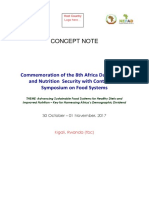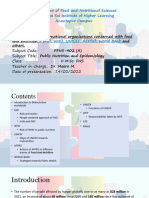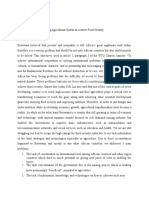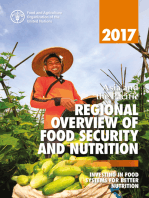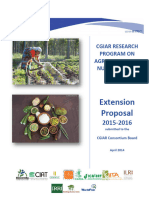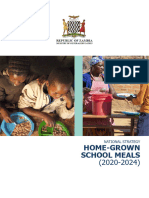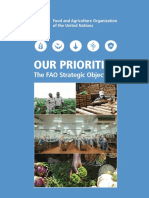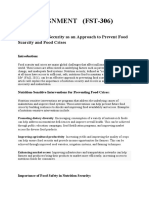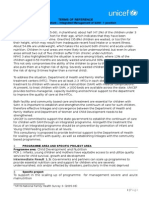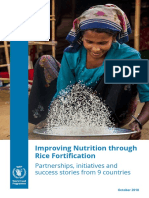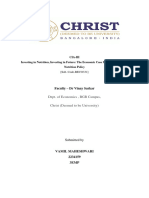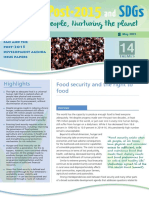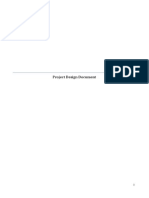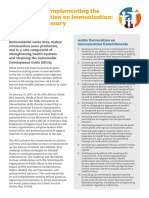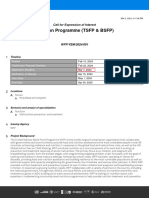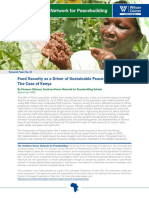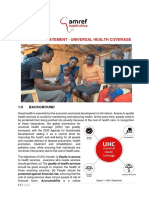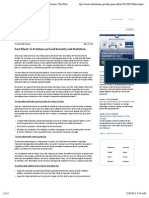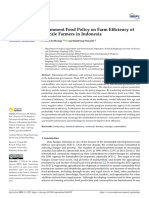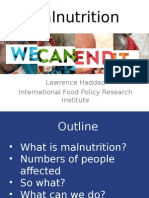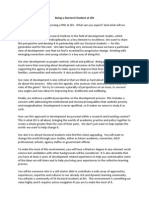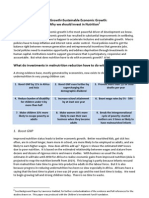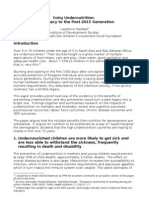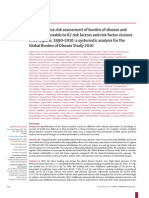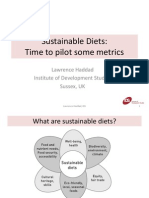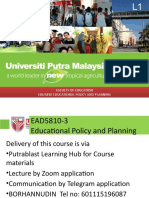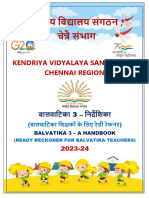FANUS Arusha Declaration 2015
FANUS Arusha Declaration 2015
Uploaded by
lawrencehaddadCopyright:
Available Formats
FANUS Arusha Declaration 2015
FANUS Arusha Declaration 2015
Uploaded by
lawrencehaddadOriginal Description:
Copyright
Available Formats
Share this document
Did you find this document useful?
Is this content inappropriate?
Copyright:
Available Formats
FANUS Arusha Declaration 2015
FANUS Arusha Declaration 2015
Uploaded by
lawrencehaddadCopyright:
Available Formats
FEDERATION OF AFRICAN NUTRITION SOCIETIES (FANUS)
ARUSHA DECLARATION 29TH MAY 2015
Evidence shows that Africa has made progress on a number of Millennium Development Goals (MDGs)
although there still remains much work to be done to achieve sustained food and nutrition security,
good nutrition and health for all. The persistent food and nutrition insecurity demands higher quality
food supply from agriculture and food systems to reduce vulnerability. Overweight, obesity and their
associated non-communicable diseases (NCDs) are increasing across our countries and contribute significantly to the multiple burdens of disease in relatively weak agriculture and health systems, whilst
anaemia, stunting, wasting and micronutrient deficiencies remain unacceptably high in our Region.
From May 25th to 29th , 2015, around 280 delegates and experts with interests in nutrition from over 26
countries met in Arusha, Tanzania for the 3rd conference of the Federation of African Nutrition Societies
(FANUS) under the umbrella theme of Nutrition in Africa at Crossroads. Experts from government,
field practitioners and programme experts, academia, NGOs, research, International Union of Nutritional Sciences (IUNS) international NGOs and bilateral organizations debated and analyzed the challenges
of improving nutrition in Africa.
The conference recognized among others, that to address Africas nutrition challenges and meet national goals and targets would require the following:
Empowerment: Empowerment of all actors, especially the most vulnerable population groups
with a focus on families and employing food based approaches
Nutrition Governance: Recognition that nutrition is a human right and yet there are challenges
of governance for nutrition the remit for which does not sit clearly in one sector. Multi-sectorial
approaches are essential but require proper leadership at the highest level of government to
ensure efficiency and accountability
Systematic Capacity Building: cross-sectoral and at all levels including higher education institutions responsible for the training of the nutrition workforce and the commitment of adequate
resources to support nutrition actions and programmes.
Harmonization of nutrition activities and training and the raising of standards to ensure the
right skills and competencies required for the workforce to make a significant contribution to
achieving and sustaining the goals for nutrition in Africa. Recognition of local contexts, priorities
and the need for stakeholder involvement to ensure standardization and competency based
curricula to meet employer and service needs.
We the delegates also recognize that 2015 marks the launch of the United Nations Sustainable Development Goals (SDGs) framework for adoption by national governments. This comes at a time when the
Malabo Declaration of the African Union spells out specific goals agreed by the Heads of States to address nutrition and food security on the continent by:
Increasing momentum to spend at least 10% of national budgets on agriculture; aim for 6 %
growth in the sector; and promote accelerated agricultural growth and transformation for
shared prosperity and improved livelihoods across the continent
Working to improve nutritional status, and in particular, targeted reduction of stunting to 10%
and wasting to 5% from current levels by 2025.
DECLARATION
1. We call on the African Union Heads of States to commit at least 3% of all Sector budgets for nutrition to ensure that the cross-sectoral issues which affect nutrition can be adequately addressed.
2. We call for clearer visibility for nutrition including specific funding commitments in the implementation of the SDGs framework.
3. We advocate clear, streamlined and fit-for-purpose national nutrition policies and governance
frameworks, their coordination, implementation, monitoring & evaluation and overall accountability for scaling up.
4. We African nutritionists recognize the competition for limited financial resources and urge prioritized investments to ensure measurable impact in meeting national nutritional needs
5. We recognize the initiatives and efforts made by African Nutrition Professional bodies and our
international partners to help address capacity gaps in the nutrition workforce and advocate national institutional support and commitment to sustain the momentum and allow for scaling up
such efforts
6. We African nutritionists pledge to work collaboratively with the African Union and its relevant
institutions such as NEPAD to provide professional expertise, leadership and support in realizing
continental goals for nutrition
7. FANUS (in its Capacity building efforts) supports and will work with other relevant organizations
in efforts to improve harmonization of competency based nutrition training in institutions in
member countries and support improvements in standards and efforts towards professional
recognition and regulation
8. We call for Africans to take leadership in addressing African malnutrition
You might also like
- Scheidel EscapefromRome Final PDFDocument694 pagesScheidel EscapefromRome Final PDFOnPointRadio100% (1)
- REPORT ON INTERNSHIP EXPERIENCES Vidya Mandir - 074208Document22 pagesREPORT ON INTERNSHIP EXPERIENCES Vidya Mandir - 074208Munmun Goswami50% (2)
- Summative Test Applied EconomicsDocument6 pagesSummative Test Applied EconomicsBeverly YM Manaog100% (8)
- Concept Note - ADFNS - Nut Symposium 2017 - DraftDocument8 pagesConcept Note - ADFNS - Nut Symposium 2017 - DraftAbigail AnziaNo ratings yet
- International Organisations Related To Food and NutritionDocument72 pagesInternational Organisations Related To Food and NutritionSwosti MohantyNo ratings yet
- (New) MUN - Modernizing Agricultural - Botswana +referencesDocument3 pages(New) MUN - Modernizing Agricultural - Botswana +referencesDwiky VialpandoNo ratings yet
- Pakistan Nutrition StrategyDocument15 pagesPakistan Nutrition Strategynhm.1974No ratings yet
- Asia and the Pacific Regional Overview of Food Security and Nutrition 2017: Investing in Food Systems for Better NutritionFrom EverandAsia and the Pacific Regional Overview of Food Security and Nutrition 2017: Investing in Food Systems for Better NutritionNo ratings yet
- Brunei and FAO PartnershipDocument2 pagesBrunei and FAO PartnershipBernice Anne DarvinNo ratings yet
- Millennium Development Goals: Goal 1 Goal 2 Goal 3 Goal 4 Goal 5 Goal 6 Goal 7Document7 pagesMillennium Development Goals: Goal 1 Goal 2 Goal 3 Goal 4 Goal 5 Goal 6 Goal 7Jeremy GarciaNo ratings yet
- WFP 0000050972Document20 pagesWFP 0000050972Hassan HaydNo ratings yet
- Sierra Leone Food Based Dietary Guidelines For Healthy EatingDocument80 pagesSierra Leone Food Based Dietary Guidelines For Healthy Eatingmohamed mansarayNo ratings yet
- Day2 Main2 LincolnUni Presentation ASEAN NUTRITIONDocument17 pagesDay2 Main2 LincolnUni Presentation ASEAN NUTRITIONtsujanaNo ratings yet
- Do Agric Policy Recommendations enDocument12 pagesDo Agric Policy Recommendations enCde Melusi LusabaNo ratings yet
- A4NH Extension Proposal 2015 2016FINALDocument19 pagesA4NH Extension Proposal 2015 2016FINALmarkandreidelacruz061503No ratings yet
- NATIONAL STRATEGY ON HGSM 2020 2024 Web 003Document44 pagesNATIONAL STRATEGY ON HGSM 2020 2024 Web 003Yellowed McLekaniNo ratings yet
- Annex To The SFD 2010 Guidelines: Cida Priorities: 1) CIDA's Food Security StrategyDocument14 pagesAnnex To The SFD 2010 Guidelines: Cida Priorities: 1) CIDA's Food Security StrategyAchaudharyNo ratings yet
- Fao Strategic ObjectivesDocument16 pagesFao Strategic Objectivesapi-309608075No ratings yet
- Food Education in The PhilippinesDocument8 pagesFood Education in The PhilippinesabigailedrosoNo ratings yet
- Programmes and Activites of Public Nutrition and HealthDocument24 pagesProgrammes and Activites of Public Nutrition and HealthPrasastha UndruNo ratings yet
- ASSIGNMENT (FST-306) Subtopic 3Document4 pagesASSIGNMENT (FST-306) Subtopic 3Ali HaiderNo ratings yet
- Caadp Compact SignedDocument13 pagesCaadp Compact SignedJoanNo ratings yet
- Jhon Dave Surbano Bsed-Science 1A The Contemporary WorldDocument8 pagesJhon Dave Surbano Bsed-Science 1A The Contemporary WorldJhon dave SurbanoNo ratings yet
- WFP-Fill The Nutrition Gap in IndonesiaDocument40 pagesWFP-Fill The Nutrition Gap in IndonesiaAlfatehan SeptiantaNo ratings yet
- UN 50 Years: Progress and Challenges For The Agriculture and Food Security SectorDocument1 pageUN 50 Years: Progress and Challenges For The Agriculture and Food Security SectorJohn Richard KasalikaNo ratings yet
- Course PlanDocument12 pagesCourse PlanDebasis SahooNo ratings yet
- Nutrition and ResilienceDocument55 pagesNutrition and ResilienceNelly FloresNo ratings yet
- Job Vacancy Announcement Action Contre La Faim-Myanmar: Program Manager (Access To Health)Document4 pagesJob Vacancy Announcement Action Contre La Faim-Myanmar: Program Manager (Access To Health)draftdelete101 errorNo ratings yet
- EOI - Innovative Ideas (Final)Document5 pagesEOI - Innovative Ideas (Final)Humayun KhanNo ratings yet
- 7.ngobox Tor State Consultant SamDocument7 pages7.ngobox Tor State Consultant SamTamika LeeNo ratings yet
- WorldFood SecuritySummit2009DeclarationDocument7 pagesWorldFood SecuritySummit2009DeclarationJose BrazNo ratings yet
- IRRI Strategic Plan 2007-2015Document64 pagesIRRI Strategic Plan 2007-2015IRRI_resources100% (1)
- Rice Fortification Success Stories in 9 Countries PDFDocument16 pagesRice Fortification Success Stories in 9 Countries PDFjavedafridiNo ratings yet
- Rice Fortification Success Stories in 9 Countries PDFDocument16 pagesRice Fortification Success Stories in 9 Countries PDFjavedafridiNo ratings yet
- CIA 3 EconDocument7 pagesCIA 3 EconVAMIL MAHESHWARI 2234159No ratings yet
- Highlights Food Security and The Right To Food: ThemesDocument28 pagesHighlights Food Security and The Right To Food: ThemesAnand VANo ratings yet
- Policies of Health Care Delivery SystemsDocument5 pagesPolicies of Health Care Delivery SystemsAbdul JamesNo ratings yet
- FANTA MultiSectoral Nutrition Aug2017 PDFDocument20 pagesFANTA MultiSectoral Nutrition Aug2017 PDFMary Rose MartinezNo ratings yet
- Nutrition-Sensitive Agriculture and Food Systems in Practice: Options for InterventionFrom EverandNutrition-Sensitive Agriculture and Food Systems in Practice: Options for InterventionNo ratings yet
- Stregnthening of Local Community Food Security in LDS 1Document41 pagesStregnthening of Local Community Food Security in LDS 1JAMIL ASUMNo ratings yet
- Project Design DocumentDocument14 pagesProject Design Documentenock4warindaNo ratings yet
- Ringkasan RPJMN Unicef WhoDocument12 pagesRingkasan RPJMN Unicef WhoLidya NazirNo ratings yet
- ADI Roadmap Executive Summary - EnglishDocument4 pagesADI Roadmap Executive Summary - EnglishjbsNo ratings yet
- MAA0002308 Pu 1Document4 pagesMAA0002308 Pu 1rowellnavarro32No ratings yet
- Type of Contract (Tick The Appropriate Box) TA Title PurposeDocument7 pagesType of Contract (Tick The Appropriate Box) TA Title PurposeTesfaye BelayeNo ratings yet
- Sampoornata Abhiyaan HandbookDocument16 pagesSampoornata Abhiyaan Handbooknkbup2003No ratings yet
- NNC GB Resolution No. 1 S. 2023 PPAN 2023 2028Document4 pagesNNC GB Resolution No. 1 S. 2023 PPAN 2023 2028Angel LamadrinNo ratings yet
- Nutrition 202020 BSFP)Document5 pagesNutrition 202020 BSFP)mohannad almekhlafiNo ratings yet
- Recommendations For The Camp David Summit: G8 Policy PaperDocument4 pagesRecommendations For The Camp David Summit: G8 Policy PaperInterActionNo ratings yet
- Food Security As A Driver of Sustainable Peace: The Case of KenyaDocument7 pagesFood Security As A Driver of Sustainable Peace: The Case of KenyaThe Wilson CenterNo ratings yet
- Federal Democratic Republic of Ethiopia: Food Systems Pathway Commitment and Position StatementDocument4 pagesFederal Democratic Republic of Ethiopia: Food Systems Pathway Commitment and Position StatementSW TelevisionNo ratings yet
- Ethiopia National Nutrition Strategy Final ReportDocument42 pagesEthiopia National Nutrition Strategy Final ReportyohansbahreNo ratings yet
- Amref UHC Capability Statement May 2018Document10 pagesAmref UHC Capability Statement May 2018Power to Youth KenyaNo ratings yet
- New Vision For AgricultureDocument4 pagesNew Vision For AgricultureCarlos Emilio Gonzalez RiveraNo ratings yet
- #3 - Case - Study - Elsalvador - Food SecurityDocument5 pages#3 - Case - Study - Elsalvador - Food SecurityAnne AnsulaNo ratings yet
- Kurukshetra August 2023 f0f9b350d6Document17 pagesKurukshetra August 2023 f0f9b350d6mydogpilluNo ratings yet
- Strategy: Roadmap For Nutrition in South Africa 2013-2017Document50 pagesStrategy: Roadmap For Nutrition in South Africa 2013-2017Laura Lopez GonzalezNo ratings yet
- The Philippine Health Care Delivery SystemDocument120 pagesThe Philippine Health Care Delivery SystemRynhart LubongNo ratings yet
- Regional Overview of Food Insecurity. Asia and the PacificFrom EverandRegional Overview of Food Insecurity. Asia and the PacificNo ratings yet
- Sec04 - 2011 - FABB - Policy Brief - FoodSecurityDocument2 pagesSec04 - 2011 - FABB - Policy Brief - FoodSecurityInterActionNo ratings yet
- US Fact Sheet: G-8 Action On Food Security and Nutrition - The White HouseDocument3 pagesUS Fact Sheet: G-8 Action On Food Security and Nutrition - The White HouseMarco FonsecaNo ratings yet
- The Impact of Government Food Policy On Farm EfficDocument14 pagesThe Impact of Government Food Policy On Farm Efficmarimasssss53No ratings yet
- 8.PHN Steps in Food and Nutritrion Program Planning and ManagementDocument15 pages8.PHN Steps in Food and Nutritrion Program Planning and ManagementKathlene GamitNo ratings yet
- We Can End MalnutritionDocument31 pagesWe Can End MalnutritionlawrencehaddadNo ratings yet
- Smith Haddad 2014: Drivers of Stunting Declines 1970-2012Document18 pagesSmith Haddad 2014: Drivers of Stunting Declines 1970-2012lawrencehaddadNo ratings yet
- Being A Doctoral Student at IDS July 14Document3 pagesBeing A Doctoral Student at IDS July 14lawrencehaddadNo ratings yet
- SUN Business Workforce Nutrition Policy ToolkitDocument14 pagesSUN Business Workforce Nutrition Policy ToolkitlawrencehaddadNo ratings yet
- Child Growth Sustainable Economic Growth: Why We Should Invest in NutritionDocument5 pagesChild Growth Sustainable Economic Growth: Why We Should Invest in NutritionlawrencehaddadNo ratings yet
- GBD Lancet Paper 2 Dec 2012Document27 pagesGBD Lancet Paper 2 Dec 2012lawrencehaddadNo ratings yet
- Ending Undernutrition: Our Legacy To The Post 2015 Generation Lawrence Haddad Institute of Development Studies in Partnership With The Children's Investment Fund FoundationDocument17 pagesEnding Undernutrition: Our Legacy To The Post 2015 Generation Lawrence Haddad Institute of Development Studies in Partnership With The Children's Investment Fund FoundationlawrencehaddadNo ratings yet
- CRA Lancet 12Document37 pagesCRA Lancet 12lawrencehaddadNo ratings yet
- Sustainable Diets - Lawrence Haddad Carraso FoundationDocument22 pagesSustainable Diets - Lawrence Haddad Carraso FoundationlawrencehaddadNo ratings yet
- Summary All Individual Development PlanDocument12 pagesSummary All Individual Development PlanZyreane FernandezNo ratings yet
- ABM ResearchDocument2 pagesABM ResearchAnne Abbygail PedrocilloNo ratings yet
- 001b L01A Education in Malaysia 12oktDocument57 pages001b L01A Education in Malaysia 12oktejat ejatNo ratings yet
- Answer Key 2023 ExamDocument77 pagesAnswer Key 2023 ExamkomalpreetNo ratings yet
- Archimedes Law Lesson PlanDocument9 pagesArchimedes Law Lesson PlanKissiMarwantiNo ratings yet
- 9 Useful-Online-Resources WebinarDocument53 pages9 Useful-Online-Resources WebinarAnonymous rWJCoarANo ratings yet
- CMS 6th Grade Info Night 030917Document20 pagesCMS 6th Grade Info Night 030917johnNo ratings yet
- World07 22 15Document36 pagesWorld07 22 15The WorldNo ratings yet
- Cambridge International General Certificate of Secondary EducationDocument8 pagesCambridge International General Certificate of Secondary EducationPranav PatchaNo ratings yet
- Study Plan Department of Physics (KAU)Document18 pagesStudy Plan Department of Physics (KAU)Alt4irNo ratings yet
- Application Form: Professional Regulation CommissionDocument1 pageApplication Form: Professional Regulation CommissionAlex Bernardo GumbocNo ratings yet
- Ulat Paglalagom Sa Oral Reading Inventory (Pre-Test) Sa FilipinoDocument52 pagesUlat Paglalagom Sa Oral Reading Inventory (Pre-Test) Sa FilipinoEdzmarie LaranjoNo ratings yet
- Easy Topics For Speech in English...Document4 pagesEasy Topics For Speech in English...Excel ChampsNo ratings yet
- ChukwuedoOmofonmwaninformationIJVTE PDFDocument8 pagesChukwuedoOmofonmwaninformationIJVTE PDFFisri hamyNo ratings yet
- MA. Course Outlines (Fresh)Document23 pagesMA. Course Outlines (Fresh)Fakhar FarooqNo ratings yet
- Paul Halmos - in His Own WordsDocument9 pagesPaul Halmos - in His Own WordsHimraj BachooNo ratings yet
- Balvatika 3 Handbook KVSDocument70 pagesBalvatika 3 Handbook KVSHridiman Rajbongshi100% (1)
- VaPoVo IO 2 Trainers ManualDocument59 pagesVaPoVo IO 2 Trainers ManualKris LopezNo ratings yet
- Student Solidarity Fund Application FormDocument2 pagesStudent Solidarity Fund Application FormlvqNo ratings yet
- 4 HigherStudiesDocument2 pages4 HigherStudiesRajatSharmaNo ratings yet
- Department of Education: Kindergarten (Modular Learning)Document1 pageDepartment of Education: Kindergarten (Modular Learning)Ai Leen Anaz NamNo ratings yet
- Causal Comparative Research - ppt-164951969Document18 pagesCausal Comparative Research - ppt-164951969Arum NismaNo ratings yet
- Hypothetical Learning Progression Plate TectonicsDocument6 pagesHypothetical Learning Progression Plate TectonicsmiksmatiasNo ratings yet
- Pragmatics Activities For ComplainingDocument12 pagesPragmatics Activities For ComplainingLuisa C. González50% (2)
- 11Nc Dec10Document11 pages11Nc Dec10Nhật NguyễnNo ratings yet
- WHLP - Q3W1 - March 22-26Document7 pagesWHLP - Q3W1 - March 22-26mariatheresa18100% (1)
- 6-27-11 Cubberley Site OverviewDocument17 pages6-27-11 Cubberley Site OverviewCitizen360No ratings yet



